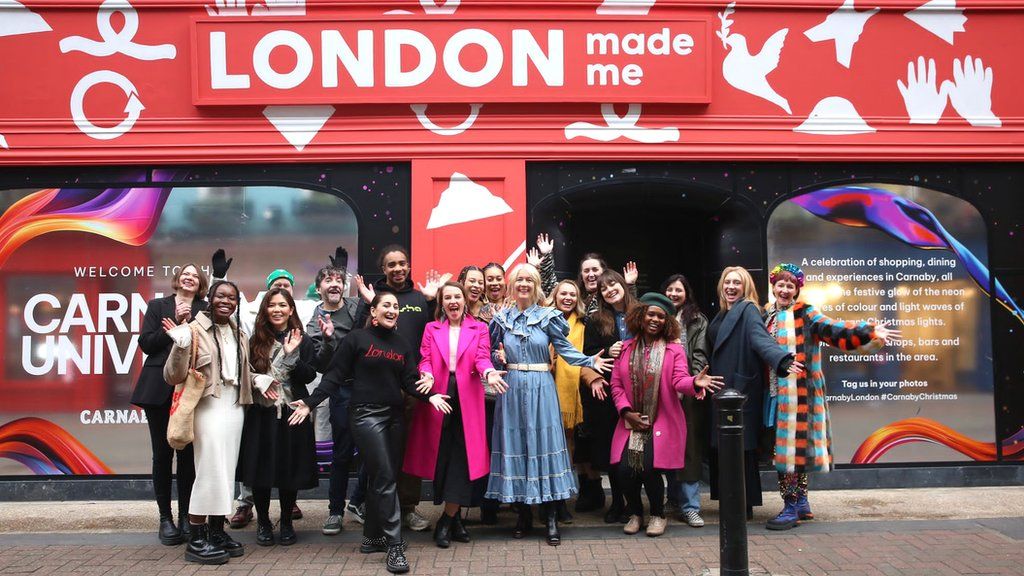ARTICLE AD BOX
 Image source, GLA
Image source, GLA
The London Made Me pop-up store ran in a vacant unit on Carnaby Street in the run-up to Christmas
By Dougal Shaw
Business reporter, BBC News
Shops are struggling on the UK's High Streets with footfall still well below pre-pandemic levels and many units lying empty. However, some believe online businesses appearing in pop-up shops can help to solve the problem.
"For clothes it's so important to try things on and see them in real life, so to be in a store is an amazing experience," says Asya Ter-Hovakimyan, who has built a fashion business online called OMNISS.
She got her first taste of High Street retail at the London Made Me pop-up shop on Carnaby Street, along with other online entrepreneurs picked by the Mayor of London's Office.
For her it offered a chance to meet loyal customers she'd only interacted with online.
The London Made Me shop filled a space left vacant when Dutch fashion retailer Scotch & Soda closed all its UK shops. It was open for the lucrative month running up to Christmas.
Ethical designer Hannah Wild also found the experience in this shop eye-opening. She's built a cult online following making fashion accessories like headbands and rings from discarded party balloon material.
Image source, GLA
Image caption,Designer Hannah Wild now wants to open her own shop one day
"The feedback from customers is invaluable and it's transforming my business," she says.
Could businesses like these, born and bred online, help to rejuvenate the UK's declining High Streets, thanks to pop-up shops?
"There used to be the fear that e-commerce could sound the death knell for the High Street," says retail analyst Natalie Berg, "but we've learned that physical and digital retail can happily co-exist and there is [in fact] a convergence."
A 2023 report from PwC found that the rapid acceleration to online shopping during the pandemic has now stabilised, with it standing at around 35% of overall sales. However, footfall on the High Street remains 10-20% below pre-Covid levels.
But it's now recognised that online businesses can actually help the High Street, says Ms Berg. There is even a term popular in retail, she explains, which is "O-2-O" - online to offline.
"Everyone from the big giants like Amazon and Asos, down to much smaller independent businesses, are looking to open stores on the High Street, to engage with customers in a real-life setting, with a seamless experience."
Pop-up shops provide that exposure to small, online businesses.
The London Made Me pop-up shop was organised as part of the Mayor's Creative Enterprise Zones scheme, with the help of a social enterprise called Creative United. But businesses have spotted this gap in the market and are running pop-ups all year round for profit.
Tillie Peel has been running pop-up shops around the UK since 2017
Former vintage clothing trader Tillie Peel set up The Pop-Up Club in 2017 to give the bricks-and-mortar experience to local, online businesses that focus on craft products and sustainability. She has transformed more than 25 empty retail spaces in cities including London, Brighton, Chelmsford and Manchester.
Her latest one near Victoria station in central London is in a unit left vacant when tea retailer T2 closed all its UK stores. It's just enjoyed the busy Christmas season, but has been extended for another month at least.
She fits her temporary shops out and sorts out issues like staffing. Commercial landlords will often pay reduced business rates if they take on a pop-up in an empty retail unit, which provides an extra incentive for them.
She handpicks around 30 designers to display their wares in each shop and those businesses have raised more than £1.3m in revenue in the past six years, she says.
"It's given me the confidence to put out new products and do test runs," says Nephthys Foster, who sells original art prints in the Pop Up Club. She has more than 30,000 followers on Instagram, but this is her first experience in a shop. She's made some invaluable wholesaler contacts too, she says, which will help expand her business.
Nephthys Foster says selling her illustrations in a pop-up has given her confidence to put out new products
Other businesses are experimenting with different ways to provide the pop-up experience.
The platform Appear Here has created an Airbnb-like model, allowing landlords and commercial property owners to rent out spaces. These can include anything from traditional shop units in arcades, to outdoor market stalls, to small spaces within bigger shops - or even warehouses.
The company Sook, founded in 2019, took a very different approach by building an empire of 13 dedicated pop-up spaces, with sites in major UK cities including London, Liverpool, Leeds and Edinburgh.
It owned the long-term lease on each shop, but deliberately fitted each one out as a blank canvas, with digital screens on the walls and adaptable front signage. This meant that when a business "popped in", it could upload its own digital branding to customise it. These businesses would have sole use of the store, rather than jostling for space with other sellers.
Sook attracted clients like fashion influencer and entrepreneur Danielle Mass, one of the top sellers on online marketplace DePop.
But despite its early successful expansion, Sook ceased trading at the end of 2023. "We still believe that our model is the future of the High Street," founder John Hoyle said at the time, but admitted he couldn't secure enough investment to continue the venture.
It's not easy to quantify the impact of pop-up shops, partly because they are not easy to define. A report in March last year indicated that their number grew in the UK by around 18% over the previous 12 months.
However, pop-ups should not be seen as a simple solution to the problem of vacant shops, cautions Natalie Berg.
"Pop-up shops are a fantastic way to inject character into our increasingly homogenous High Streets, but they are not a panacea," she says.
"Pop-ups are something of a piecemeal movement and their success can be hit and miss. They are also by definition just temporary, so even the best ones may struggle to build momentum."
For many "pop-up entrepreneurs", time in a shop is their first taste of retail "in real life". These online businesses sample the age-old benefits of High Street retail, like footfall and face-to-face feedback, without any long-term financial commitments such as leases or business rates.
Some may even want to find a permanent home for their businesses on our High Streets as a result.
As Nephthys Foster confesses, after she chats to a customer who recognises her from Instagram, "I definitely think I'll have my own shop in the future - I'm manifesting it!"
Dougal Shaw is on X, formerly Twitter

 1 year ago
42
1 year ago
42








 English (US) ·
English (US) ·